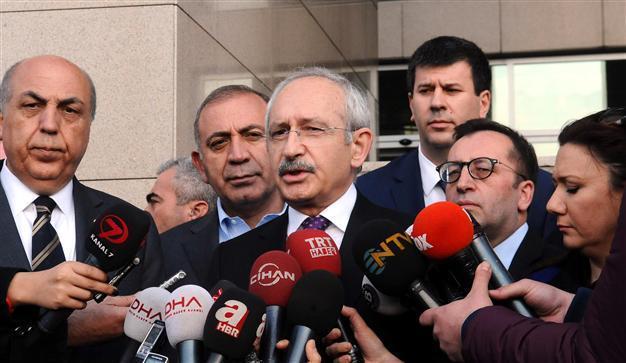Main opposition questions reasons behind secrecy over autopsy report
Şükrü Küçükşahin - ANKARA

“I wonder why a confidentiality decision has been taken for the autopsy report. The incident is over, the results are obvious. What kind of a problem is there for the public to know which gun the bullets came from?” asked Kılıçdaroğlu. DHA Photo
Main opposition Republican People’s Party (CHP) head Kemal Kılıçdaroğlu has questioned why an autopsy report for slain prosecutor Mehmet Selim Kiraz has been declared secret even after the incident was finalized.“I wonder why a confidentiality decision has been taken for the autopsy report. The incident is over, the results are obvious. What kind of a problem is there for the public to know which gun the bullets came from?” asked Kılıçdaroğlu.
Kılıçdaroğlu said Kiraz was investigating the death of Gezi victim Berkin Elvan in depth but that there were powers that did not want light to be shed on the case.
“The martyred prosecutor, Mehmet Selim Kiraz, was steadfastly conducting the Berkin Elvan investigation but there are some dark hands that do not wish for the issue to be solved. This is the main reason for terror,” he said.
The two perpetrators, Şafak Yayla and Bahtiyar Doğruyol of the outlawed Revolutionary People’s Liberation Party/Front (DHKP/C), took Kiraz hostage on March 31, demanding that the police officers who shot dead 14-year-old Elvan during the Gezi protests publicly confess to the killing in return for the prosecutor’s life.
Kılıçdaroğlu said the ruling Justice and Development Party (AKP) was overwhelmed in every aspect and that they could not govern or produce policies regarding these problems.
“As they could not overcome this [situation], they found the solution in terror. This is the most dangerous thing for a country, I am warning you. They are splitting the nation; these are all dangerous initiatives,” said Kılıçdaroğlu.
Elvan succumbed to his injuries on March 11, 2014, after remaining in a coma for 269 days after he was hit in the head by a tear-gas canister by police at the height of the Gezi Park protests in summer 2013. Elvan was out to buy bread in the neighborhood where he lives in Istanbul’s Okmeydanı area.
















